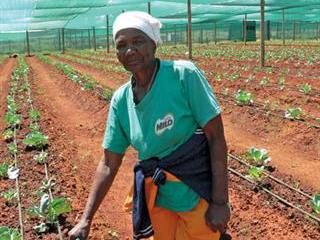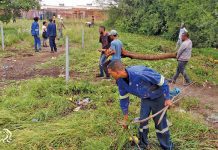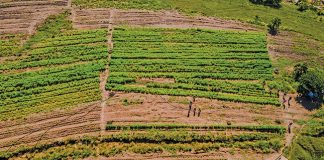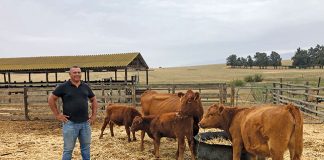
Aredirisaneng’ means “Let’s work together” – and it’s well-named. Here is an excellent example of what can be achieved when companies, the government and small-scale farmers join hands to create employment.The story begins early last year when First Uranium Ezulwini Mine in Randfontein made a commitment to fight poverty in the surrounding area.
The mine established a partnership with the Randfontein Local Municipality and Gauteng Department of Mineral Resources, and together they created the Elandsfontein Agri Farm project to grow vegetables for sale at local markets. Randfontein municipality provided 5ha of land, and the mine committed R1,39 million for the first year of operation.
During construction, the project employed 10 members of the community for seven weeks, and 15 more people should be permanently employed by the time the farm is running at full capacity. According to project manager Peter Steenkamp, the Elandsfontein Agri Farm aims to help co-operatives develop skills to produce fresh produce commercially.
Training
The next step was to find people interested in growing vegetables, then give them training and backup. It didn’t take long to get many enthusiastic volunteers, and 10 of these were finally selected to form the Aredirisaneng Agricultural Co-operative. Shade-netting was erected to protect the crops, and the women were soon hard at work learning all about soil preparation and vegetable-growing techniques, as well as how to run a business and manage its finances.
The co-operative’s members will be mentored for five years, at the end of which, provided their progress is satisfactory, they will become full owners of the project. It’s an exciting goal, and these women are determined to succeed.
Life-changing
At 25, Alina Plaatjies is the youngest member. She is passionate about working the land and has previous experience at subsistence farming in communal vegetable gardens. Unable to make enough money from this, she found a job as a health worker at the Elandsfontein clinic. But she didn’t enjoy the work, and was delighted when the Aredirisaneng opportunity presented itself.
She resigned from the clinic and has been involved with the co-operative from the start. “Thanks to this project, I’m doing what I love,” says Alina. “Also, the pay here is better. But what I like most of all is that this is our project – we’re working for ourselves.” According to Peter, Aredirisaneng’s members were chosen with help from the Department of Local Economic Development and community leaders, and their numbers were purposely limited. He believes that a co-operative of this nature should not exceed 10 members as it’s difficult to manage more people.
Shade netting
The project currently operates under two shadecloth structures each covering a hectare. The nets allow the women to grow vegetables all year round, as it offers protection against the hot sun in summer and frost in winter. The shade also provides more pleasant working conditions, especially in summer.
Each structure can accommodate about 50 000 cabbages or 70 000 spinach plants. Chillies and spring onions are also grown. “These are the most popular vegetables in many households,” says Peter. “Quantities are decided by market demand.” The structures are each separated into sections, and each member is responsible for weeding and managing pest control in one section.
“We try to make sure that everyone has equal responsibilities,” he explains. “But sometimes the younger members have to do the heavier duties.” During harvesting, the members divide into two groups, with five doing the actual harvesting and five washing and packing the produce for the market.
The project also employs part-time workers to help during this busy time. Before planting, the members plan ahead, making sure that they are able to provide a steady supply week by week, and all year round. This also helps with their cash flow. On average, they plant a total of about 1 000 seedlings of various types a week.
Securing markets
Peter points out that it’s critical to have a ready market for one’s produce, and says that Aredirisaneng has secured contracts through several fresh produce outlets. Fruit & Veg City stores in Krugersdorp and Randfontein, and Abbas Fruit & Veg in Johannesburg have signed off-take agreements, and the co-op also supplies the Johannesburg Fresh Produce Market. He emphasises that finding markets was not that difficult as the quality of their produce spoke for itself.
“At first, some of the store owners wanted to turn us down, but once we showed them the produce, they couldn’t resist,” he says. “More and more businesses are willing to support emerging farmers, so the quality of the product has to be at the same standard as that of commercial producers.”
Getting the sums right
At this stage, the members’ salaries are still drawn from the initial fund provided by the mine. For the farm to break even, it has to generate about R35 000 a month in sales. “This will enable the members to pay their expenses including a living wage,” Peter explains.
Encouragingly, the farm exceeds its sales targets from time to time. When this happens, 50% of the extra money is invested back into the business and 50% is shared among the members as a bonus. “This motivates everyone to work even harder,” says Peter.
At its current production capacity, Aredirisaneng anticipates a net profit of R120 000 for the first year. So successful is the project that the co-op and its overseers are already looking at adding three more shade net structures, increasing the size of the area under production by 150%.
Contact Peter Steenkamp on 083 654 1338













